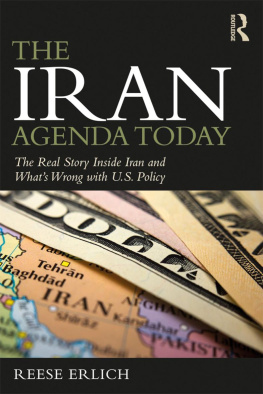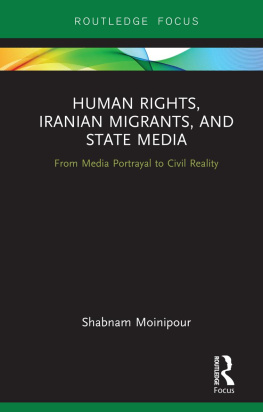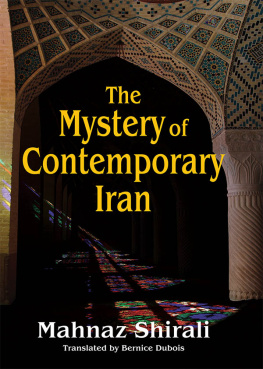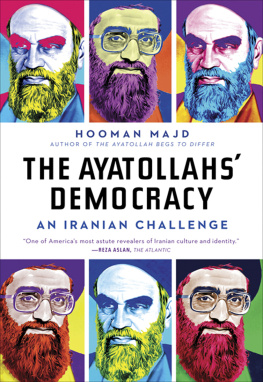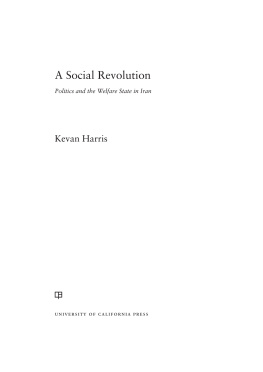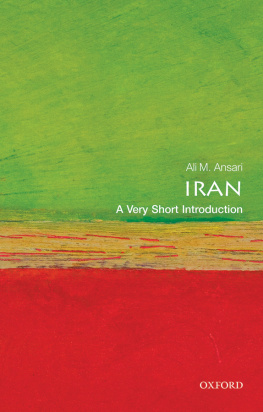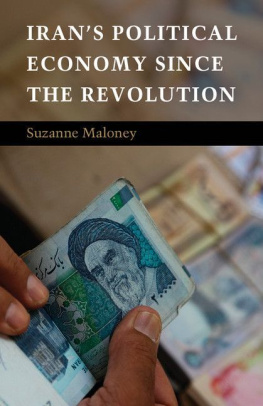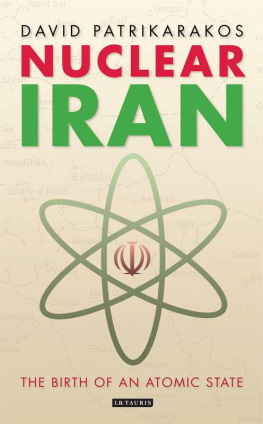Published in 2011 by I.B.Tauris & Co Ltd
6 Salem Road, London W2 4BU
175 Fifth Avenue, New York NY 10010
www.ibtauris.com
Distributed in the United States and Canada
Exclusively by Palgrave Macmillan
175 Fifth Avenue, New York NY 10010
Copyright 2011 Janne Bjerre Christensen
The right of Janne Bjerre Christensen to be identified as the author of this work has been asserted by the author in accordance with the Copyright, Designs and Patent Act 1988.
All rights reserved. Except for brief quotations in a review, this book, or any part thereof, may not be reproduced, stored in or introduced into a retrieval system, or transmitted, in any form or by any means, electronic, mechanical, photocopying, recording or otherwise, without the prior written permission of the publisher.
International Library of Iranian Studies 32
ISBN 978 1 84885 639 4
A full CIP record for this book is available from the British Library
A full CIP record for this book is available from the Library of Congress
Library of Congress catalog card: available
Typeset by Newgen Publishers, Chennai
ACKNOWLEDGEMENTS
An experience that changes us, that prevents us from always being
the same, or from having the same kind of relationship
with things and with others that we had before
Michel Foucault (1991c)
Working on Iran has been like a passionate and difficult marriage, which has deeply affected my life and voice as a writer. By the same token, being evicted from Iran seemed like a traumatizing divorce, against my wishes. But despite the disappointment I have retained an immense gratitude to all the people in Iran who made the place possess me, and this gratitude has encouraged me to continue and unfold the dilemmas, controversies and compromises of Iranian politics.
I want to thank all the people who took me in, showed me their Iran and made my fieldwork possible, some of whom would probably prefer not to be mentioned but I would specifically like to thank Dr. Hooman Narenjiha from the Darius Drug Research Centre, Dr. Bijan Nasirimanesh and the Persepolis Harm Reduction NGO, Maziar Bahari for fuelling my interest in Irans outcasts, and Afsar for her enormous hospitality. I am profoundly grateful to Dr. Ramin Jahanbegloo, who very early in the process encouraged me to undertake this study and has continuously challenged me to become a more reflexive analyst.
This book developed as the result of a PhD in International Development Studies at Roskilde University, Denmark. I am grateful to the Danish Research Council for granting me the funds to do my research. I deeply thank my supervisor Professor Fiona Wilson for all her accurate, energizing comments, for believing in me, and making me believe I might somehow get there. Intense gratitude goes to my co-supervisor Professor Susan Wright, who shared my fate of being expelled and directed my anthropological gaze in a most fruitful way, and to my co-supervisor Lars Erslev Andersen for his critique, bound in analytical clarity, honesty and friendship.
I am very grateful to my family for their encouragements and patience: my mother, Grith, my father, Vagn, and Kirsten for giving me the courage to undertake a project of this magnitude; and my sister Nynne for her never-failing friendship. She has been a crucial cornerstone throughout my life, and continues to be so, now joined by Simon and their kids.
Among my friends I particularly wish to thank Flemming Flyvholm for his amazing ability to guide me back on track, whenever I lose my way; and Christian Fabiansen for making me laugh when I feel least inclined to do so. I am indebted to Daniella Kuzmanovic and Sren Hove for their constructive comments to a number of drafts, and to Sren for the months we shared in London, while I was a visiting researcher at the School of Oriental and African Studies, in the spring of 2006. I am grateful to all my friends in England, especially Jason Reeves and Akshay Davis, who put me up on my numerous visits.
For stimulating input and inspiring conversations along the way my appreciation goes to Nancy Lindisfarne, Richard Tapper, Saeed Zeydabadi-Nejad, Siamak Namazi, Bijan Khajehpour, Amir Ali Nourbakhsh, Steffen Jhncke, Sune Segal, Birgitte Bruun, Lea Unni Joensen, Frida Hastrup, Katinka Fjelds Villemoes, Emil Madsen Brandt, and Kristian Morville. At Roskilde University, I thank all of my colleagues for their support, particularly Professor Christian Lund for our fruitful discussions and Inge Jensen for providing the best possible environment for PhD students. I thank the award-winning photographer Jeroen Oerlemans for letting me use his picture from the Persepolis Harm Reduction NGO in Tehran for the jacket image; Roya Moghaddas for translating enormous amounts of Persian articles; and Sylvana Kolaczkowska for editorial assistance.
Last, but not least, I thank Allan Otte for his affection and relentless support in the last, long stretch of writing up, and for replacing my divorce from Iran with a real, true and deeply engaging relationship.
Despite these acknowledgements, whatever I present here is purely my own responsibility.
A short part of is published in Hooglund and Steenberg (eds), Navigating Irans Essence: Challenging Accepted Perceptions (Routledge, forthcoming). I thank the authors for letting me reproduce it here with their permission.
JANNE BJERRE CHRISTENSEN
Copenhagen
NOTE ON TRANSLITERATION
Transliteration of Persian words follows a modified version of the one adopted by the International Journal of Middle East Studies. For simplicity, no diacritical marks are used, except for ayn (). Words commonly used in English, like Koran, Imam and Ramadan, are spelled according to their established English spellings. All Persian words are in italics, but names of persons are not. In Persian words, but not names, I transcribe alef as .
The articles translated from Iranian newspapers are listed in a special section of the bibliography. These articles have all been obtained from the BBC Monitoring Iran archive, and I follow the BBCs spelling of names.


